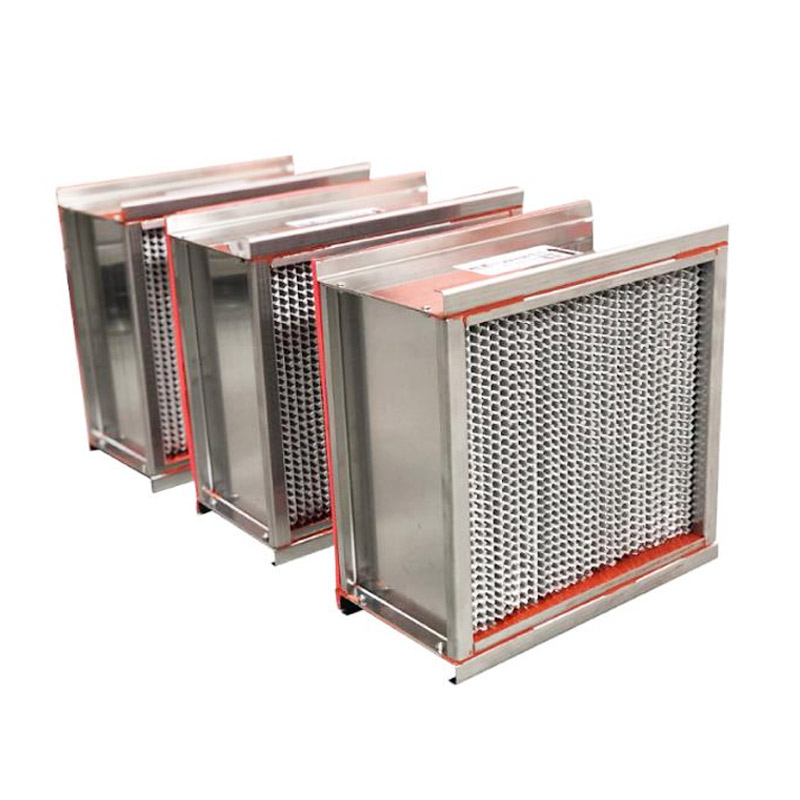High-temperature HEPA (High-Efficiency Particulate Air) filters are essential components in environments where elevated temperatures pose a challenge to standard filtration systems. Designed to maintain superior air quality and particle removal efficiency under high-temperature conditions, these filters are crucial in various industrial and specialized applications. This article provides an in-depth look at high-temperature HEPA Filters, their design, applications, and the unique characteristics that distinguish them from standard HEPA Filters.

Understanding High-Temperature HEPA Filters
High-temperature HEPA filters are engineered to operate effectively in environments where temperatures exceed the limits of conventional filters. They are designed to capture and remove airborne particulates with a high degree of efficiency, typically achieving a filtration efficiency of 99.97% for particles as small as 0.3 microns. The ability to function at elevated temperatures without compromising performance is a key feature of these filters.
Design and Construction
The design and construction of high-temperature HEPA filters are tailored to withstand harsh conditions while delivering optimal filtration performance:
Filter Media: The core of a high-temperature HEPA filter is its filter media, which is made from specialized materials that can endure high temperatures. Common media materials include glass fibers and synthetic fibers treated to resist heat. These materials maintain their structural integrity and filtration efficiency even at elevated temperatures.
Frame and Housing: The filter's frame and housing are constructed from heat-resistant materials such as aluminum, stainless steel, or high-temperature plastics. These materials are chosen for their durability and ability to withstand thermal expansion and contraction.
Seals and Gaskets: High-temperature HEPA filters use specialized seals and gaskets made from materials like silicone or fluoropolymer. These seals prevent air bypass and ensure a tight fit within the filter housing, maintaining the filter's efficiency and performance.
Support Structures: Internal support structures, such as metal mesh or grid systems, are used to provide structural stability and prevent media collapse under high temperatures and airflow pressures.
Applications in Industrial Processes
High-temperature HEPA filters are employed in a variety of industrial processes where controlling airborne contaminants is critical, and high temperatures are prevalent:
Metal Processing: In metal smelting and processing facilities, high-temperature HEPA filters are used to capture metal fumes and particulates that are generated at high temperatures.
Glass Manufacturing: The glass manufacturing process involves extremely high temperatures, and high-temperature HEPA filters are used to ensure that airborne glass particles and other contaminants are effectively removed from the air.
Chemical Processing: Chemical processing plants often operate at elevated temperatures, and high-temperature HEPA filters help to capture hazardous chemicals and particulates that could affect product quality and worker safety.
Pharmaceutical Production: In pharmaceutical manufacturing, high-temperature HEPA filters are used to maintain cleanroom environments by removing airborne contaminants during processes that involve heat.
Impact of High Temperatures on Filter Life
The lifespan and performance of high-temperature HEPA filters are influenced by the thermal conditions in which they operate. High temperatures can impact filter life in several ways:
Material Degradation: Prolonged exposure to high temperatures can lead to degradation of filter media and frame materials. This can result in reduced filtration efficiency and structural integrity.
Increased Loading: Filters operating in high-temperature environments may experience increased loading of particulates, necessitating more frequent replacements or maintenance.
Thermal Cycling: Repeated heating and cooling cycles can cause thermal cycling, leading to potential fatigue and wear of filter components.
To address these issues, high-temperature HEPA filters are designed with robust materials and construction techniques that mitigate the effects of thermal stress and extend the filter's operational life.
Comparison with Standard HEPA Filters
High-temperature HEPA filters differ from standard HEPA filters in several key aspects:
Temperature Tolerance: High-temperature HEPA filters are specifically engineered to operate at elevated temperatures, while standard HEPA filters are designed for lower temperature conditions.
Material Composition: The materials used in high-temperature HEPA filters are chosen for their heat resistance, whereas standard HEPA filters use materials suited for more moderate temperatures.
Construction Features: High-temperature HEPA filters include additional features such as heat-resistant frames and gaskets, which are not typically found in standard HEPA filters.
Regulatory Standards and Compliance
High-temperature HEPA filters must meet specific regulatory standards and compliance requirements, depending on their application and industry. Standards such as those set by the American Society of Heating, Refrigerating and Air-Conditioning Engineers (ASHRAE) and other international bodies ensure that these filters meet performance and safety criteria.
Future Trends and Innovations
The field of high-temperature HEPA filters is evolving with advancements in materials and technology. Future trends include:
Enhanced Materials: Development of new materials with improved heat resistance and filtration efficiency.
Improved Design: Innovations in filter design to enhance performance and reduce maintenance needs.
Energy Efficiency: Advances in filter technology to improve energy efficiency and reduce operational costs.
Smart Filters: Integration of monitoring and control systems to optimize filter performance and lifespan.
Conclusion
High-temperature HEPA filters play a vital role in maintaining air quality and ensuring safety in environments with elevated temperatures. Their specialized design and construction enable them to operate effectively in demanding conditions, making them essential in various industrial and specialized applications. As technology continues to advance, high-temperature HEPA filters will evolve to meet the increasing demands of modern industries, offering improved performance and efficiency.





